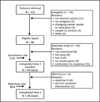A tailored Web-based psychoeducational intervention for cancer patients and their family caregivers
- PMID: 24945270
- PMCID: PMC4164300
- DOI: 10.1097/NCC.0000000000000159
A tailored Web-based psychoeducational intervention for cancer patients and their family caregivers
Abstract
Background: Most programs addressing psychosocial concerns of cancer survivors are in-person programs that are expensive to deliver, have limited availability, and seldom deal with caregivers' concerns.
Objective: This study examined the feasibility of translating an efficacious nurse-delivered program (FOCUS Program) for patients and their caregivers to a tailored, dyadic Web-based format. Specific aims were to (1) test the preliminary effects of the Web-based intervention on patient and caregiver outcomes, (2) examine participants' program satisfaction, and (3) determine the feasibility of using a Web-based delivery format.
Methods: A phase 2 feasibility study was conducted with cancer patients (lung, breast, colorectal, prostate) and their family caregivers (N = 38 dyads). The Web-based intervention provided information and support tailored to the unique characteristics of each patient, caregiver, and their dyadic relationship. Primary outcomes were emotional distress and quality of life. Secondary outcomes were benefits of illness/caregiving, communication, support, and self-efficacy. Analyses included descriptive statistics and repeated-measures analysis of variance.
Results: Dyads had a significant decrease in emotional distress, increase in quality of life, and perceived more benefits of illness/caregiving. Caregivers also had significant improvement in self-efficacy. There were no changes in communication. Participants were satisfied with program usability, but recommended additional content.
Conclusions: It was possible to translate a clinician-delivered program to a Web-based format that was easy to use and had positive effects on dyadic outcomes.
Implications for practice: The Web-based program is a promising way to provide psychosocial care to more patients and caregivers using fewer personnel. It needs further testing in a larger randomized clinical trial.
Conflict of interest statement
Conflicts of interest and sources of funding. The authors have no conflicts of interest to disclose.
Figures
References
-
- American Cancer Society. [Accessed February 5, 2013];Cancer Facts and Figures. 2013 http://www.cancer.org/acs/groups/content/@epidemiologysurveilance/docume....
-
- Edler NE, Page AE, editors. Institute of Medicine. Cancer Care for the Whole Patient: Meeting Psychosocial Needs. Washington, DC: The National Academy of Science; 2008.
-
- National Alliance for Caregiving. e-Connected Family Caregiver: Bringing Caregiving into the 21st Century. Bethesda, MD: 2011. [Accessed February 5, 2013]. http://www.caregiving.org/data/FINAL_eConnected_Family_Caregiver_ Study_.... Published January 2011.
-
- Strecher VJ. Internet methods for delivering behavioral and health-related interventions (eHealth) Annu Rev Clin Psychol. 2007;3:53–76. - PubMed
Publication types
MeSH terms
Grants and funding
LinkOut - more resources
Full Text Sources
Other Literature Sources
Medical




